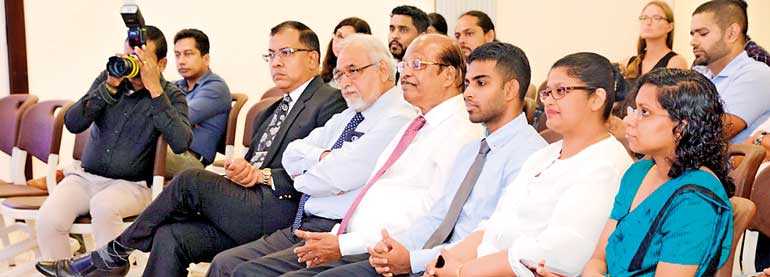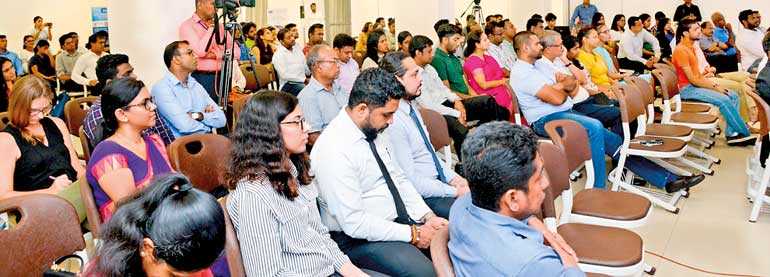Tuesday Feb 17, 2026
Tuesday Feb 17, 2026
Monday, 2 September 2019 00:26 - - {{hitsCtrl.values.hits}}



Business Redefined: Adapt or Diminish, saw a convergence of industry experts on the subject of Data Analytics, which took place on Friday 16 August at the RIC premises.
The symposium featured Dr. James Abdey, Associate Academic Director of London School of Economics and Political Sciences (LSE) a constituent of the University of London; Gaurika Wijeratne, AVP, Fortude; Rohan Jayaweera, COO Antyra Solutions and Umar Ghouse, Technology Innovator, Frontier Research and the session was moderated by Anton Thayalan, Business Consultant, Zeallegiant Holdings Ltd.
Among the list of invitees were data enthusiasts ranging from corporates to scholars. The Symposium focused on businesses adapting to a data-driven approach to facilitate superior decision making. The Symposium brought to light many pertinent concerns of Sri Lankan businesses and drew many discussion points from the gathering, which were discussed for clarity.
Data never sleeps: it is estimated that by 2020, there will be 40 times more bytes of data created. To put this into perspective, it would be a quantity which is more than the observable stars in the universe. With every like, swipe, click and share data is created. With this, the discussion focused on the characteristics of ‘Big Data’, which is data generated in massive volumes at high velocity and variety. With data creation in such abundance, the primary concern then is the supply of human talent with the requisite skills to process and analyse data. Without the human element to process the data, sift through its data would be redundant.
It is a common misconception that computers alone can process and then analyse data. Computers perhaps could process or ‘Crunch’ the data. However, the theory or hypothesis needs to be provided by the human element. Hence, we see a demand for skilled Data Scientists; yet the supply of such talent in the market today is alarmingly low, and the said gap is presumed to grow. With a high market requirement, any financially savvy individual will identify that the future lies in tapping into this job market where there is a deficit of human ability; this is apparent so as many corporates now scramble to cultivate a data culture.
Data is revolutionising businesses. The process of extracting information from multiple sources, organising information and identifying patterns and co-relations is the process of using data to make informed business decisions. Organisations wanting to maintain a competitive edge will tap into the data that it is creating. After all, the key to gain and retain customer loyalty is maintaining experience-based service. A business, without the knowledge extracted from data, is unable to develop strategies, KPIs or make decisions. If an organisation does not make use of this information, then be assured that a competitor will.
Tools for data analysis are available in Sri Lanka today; however, quite underutilised as there is primarily a gap between computation and data organisation. With the influx of data, most organisations are ill-geared to handle data and to build the required models for data processing. A key factor for this is the bureaucracy prevalent in many organisations. The layers which data are passed through or buried under make retrieving data an arduous task. Organisations should first work on liberating data for effective computisation, for example, with an ERP.
Bottlenecks that could be encountered when implementing are many, but experience shows that the main requirement for successful implementation is top management directives. IT services and CRM input all bring data into a single accessible layer with varying dashboards, which aids in driving the business. With buy-in from the top management, business users are encouraged to exclusively adapt to the data platform, which is a first hard, but imperative step in moving towards a data-driven culture.
Another reason to liberate data and build models around it is the opportunity to gain business opportunities first. Implementing a data-driven culture in an organisation is not a single act but a ‘journey’. There is a requirement for governance, legal framework to mention a few which needs consideration – more substantial conglomerates who can have teams who have already embarked on this ‘journey’. However, smaller businesses and SMEs too can secure quick wins by harnessing data and basing service experience on this gathered data.
Validity and credibility of data is also a rising concern, and often needs to be investigated and is often a bottleneck for new as well as established businesses. Data Integrity issues arise when data is sourced from diverse data sets, which throw vastly different estimates. Data sets need to be cleaned to be credible at the point of building a model capable of yielding accurate results.
Another consideration when redefining a business with data is the redundancy and availability of data. If teams are operating silos oblivious of the other data in an organisation, this can cause data redundancies and inefficiencies. Having a centralised database and informed cooperative team culture can quickly cure redundancy. Availability, of data however, is a more significant issue; caused by data segments being isolated, not being gathered or not being publicised and can only be addressed through improving and automating data collection.
We also need to consider that decisions are made at present, whereas the consequences of the decision’s effects will be felt in the future. Decisions are then made with a level of uncertainty, which can be mitigated to an extent. How? By considering subjectivity, validity and predictions of the model built to analyse data and maximise the probability of success. Using clean, credible, reliable data, optimal decisions or somewhat data-driven decisions can be made and are far better than relying on opinionated decisions in the long run.
A data-driven culture is best created with a data analytics team. This need has given way to the lack of data scientists as well as data engineers. Data warehouses will require creation. Experts with training and certification will be highly sought-after commodities. Advanced analytics skills paired with programming knowledge and domain knowledge are the prerequisites if anyone is hoping to join the data analytics team.
The objectivity of creating a Data Science and Business Analytics Degree under the academic coordination of LSE was to develop the skill sets of an adapt data scientist. Data as a subject in itself is infinite, as is the material available. However, the syllabus was designed under ‘constrained optimisation’ to produce job-ready students. The program itself is built to be interdisciplinary, based in Mathematics, Statistics, Programming, Economics, and Management while incorporating a data visualisation layer. The aim is to create highly employable individuals with a structured blend of theory, practical application and with a stress on communication skills, considering that ultimately data analysts are not the key decision-makers but need to communicate the data findings effectively.
Before educational certifications, finding a data scientist in its entirety was akin to hunting for a unicorn. Thus, organisations were forced to hire many to facilitate the many facets of a data scientists’ job. Mathematicians, Statisticians, programmers and storytellers were all put in a collective effort. Today a well-rounded certified individual is available for hire.
Further inspecting the evolution of data analytics, once limited perhaps to a few fields in finance or investment, now we see the application of data science across industries demonstrating a genuinely interdisciplinary nature. Law and law enforcement have seen the benefits of adopting a data-centric approach. Forensic statistics from a criminal law perspective provides conclusive data on which sound judgments can be based. Forensic statistics are now developed to complete partial fingerprints, achieve entire DNA patterns from a tiny blood splatter and estimate time and variables of decomposition, which provide a more complete and conclusive platform for evidence presentation.
In law enforcement, predictive patterns assist in forecasting crime patterns, or even profiling, which aids in the apprehension of criminals easier, and often data scientist are consulted to uphold the integrity of the law. All based on the right data, with the right model will help arrive at the right decision. One considering education for the future, no doubt would look to Data Science and Business Analytics. However, seeing that global higher education in this field is still quite undefined, it is best that scrutiny is paid when selecting a program to follow. In a market where claims to superiority are seen recurrently, it is best to examine the modular content and extent on the subjects. The interdisciplinary nature of the subject requires a broad skill set to be developed. The curriculum developed by LSE, endeavours to inculcate the conceptual understanding of the wider world where data-driven decisions are being made. RIC is the first affiliated teaching centre globally, to offer the UoL Data Science and Business Analytics programs (Bachelor’s and Graduate Diploma). RIC is keen to enable the aspiring youngsters of today to prepare for the jobs of the future.
The Data Analytics landscape in Sri Lanka today is one of low hanging fruit. The name of the game is speed; the speed in which a business can redefine itself to be data-centric. To adapt means to reap the benefits of easily accessible wins through sound decisions made based on data. The future begins here!
Pix by Lasantha Kumara